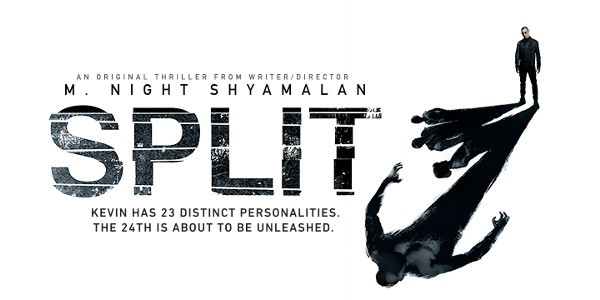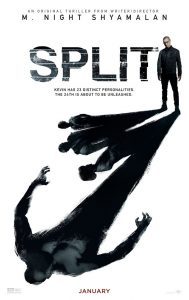Yes, there’s a big reveal at the end of M. Night Shyamalan’s new movie, Split. But it’s not a BIG reveal like the one in The Sixth Sense, or a goofily contrived reveal like the one in Signs. The twist in Split is almost perfect. It’s subtly arranged, timed just right, and rings a surprisingly sad note that makes the entire movie resonate with emotion.
Despite appearances, Split isn’t a horror movie. Well, except for the last ten or so minutes. Until then, though, it’s a straightforward psychological thriller. And even when events turn horrific, Shyamalan’s either prudish or gentlemanly aversion to bloodshed keeps things from turning very gruesome. I’m not saying bring the kids. I’m just saying you won’t see anything in Split that you couldn’t see after 9 p.m. on broadcast TV.
The conventions of review writing require that I now summarize the plot in some way even though the trailers give a pretty clear idea of what happens in Split. So:
Kevin Crumb (James McAvoy), a man with dissociative identity disorder, i.e., multiple personalities, abducts three teenage girls from a mall parking lot and keeps them in his lair—a series of rooms in what appears to be the basement of an abandoned building—under lock and key, telling them they’re “sacred food” for the Beast. In fact, we don’t meet Kevin until fairly far along in the movie. It’s stern, type-A Dennis who abducts the young women. Matronly Patricia tries to reassure them that everything’s going to be just fine (meaning everything will go according to plan, which will not be fine). She also keeps Dennis from making them dance naked for him, which is his thing, apparently. Nine-year-old Hedwig chats them up. (Hedwig, to my eye, looks and acts like a little boy. Hedwig is a girl’s name. I don’t know what this means.) And Barry, the sweet-natured fashion designer, shows up for Kevin’s sessions with his/their psychiatrist, Dr. Fletcher (Betty Buckley). There are several such sessions because one of Kevin’s selves is afraid of what’s going on and keeps sending emails to Dr. Fletcher, begging for emergency sessions. But when they get together, Barry just tells the good doctor that everything’s fine, just fine. He was just having a moment.
The interviews between Dr. Fletcher and Barry are a useful narrative tool. They allow Shyamalan to fill us in on details we might have a hard time gathering if everything were shown-not-told. For example, we find out from Dr. Fletcher that Kevin has twenty-three personalities on file and we’ve only met Dennis, Patricia, Hedwig, and Barry because they’ve figured out how to keep “the light” to themselves. (I like the concept of existence as being in the light. It suggests that poor Kevin, locked away by his other selves, is as much a prisoner as the three young women in his dungeon.) The interviews are also a chance for James McAvoy to show what a fine actor he is. During these tête-à-têtes the camera closes in on McAvoy’s face until it fills the screen, which seems appropriate given the all-consuming nature of Kevin’s narcissism, and McAvoy manages to convey depths of suffering with a few dodgy looks, a few imploring expressions. Every time he talks to Dr. Fletcher and swears up and down that nothing’s wrong, you can sort of feel Kevin lurking somewhere in the background, crying out to warn her about what’s coming.
And what’s coming is the Beast. Maybe.
Dr. Fletcher thinks the Beast is just a figment of the other selves’ imagination—a delusion’s delusion. She also believes that people with dissociative identity disorder have tremendous power to transform themselves physically through sheer force of will, and describes to some of her dubious colleagues the case of a woman whose cancer went into remission after she’d developed a personality that didn’t have cancer, and another case of a man who suddenly could lift three times his body weight after forming an alternate self who was a Russian weightlifter. The Beast, according to Kevin’s other selves, is huge and incredibly strong, has skin as thick as rhinoceros hide, and eats human flesh. The stage is neatly set for a monstrous transformation, which bodes ill for Kevin’s prisoners, should it turn out to be more than mere fantasy.
Claire and Marcia (Haley Lu Richardson and Jennifer Sula) are boring Millennial types, Millenials as seen through the eyes of an aging Gen-Xer: coddled, self-satisfied, what middleclass America, with its insatiable desire to find the lowest common denominator of everything, likes to think of as healthy. Kevin & Company chose Claire and Marcia precisely because of their good health and untested natures. He wants to get even with the hale and well adjusted. He grabbed our heroine, too, Casey (Anya Taylor-Joy), only because she was in the wrong place at the wrong time. Casey is more complicated than Claire and Marcia. She’s a brooder and less social, sometimes a troublemaker at school. The other two, whose imaginations stop at surfaces, think Casey is just another weirdo. But she’s the smartest and most resourceful of the three and knows that their best chance to escape is to work with Kevin & Company, to figure him out, sympathize with him. We learn from a sequence of flashbacks that Casey has dark secrets of her own, that there are compelling reasons she is the way she is, just as there are compelling reasons that Kevin is the way he is, and one of the things that I really like about Split is that it wants to remind us, constantly, that we don’t choose our personalities the way we choose our wardrobe, that personality is hardly a matter of choice at all. This is something we’d do well to remind ourselves when we pass judgment on someone who strikes us as weird. We should always want to understand the other, especially when the other is hard to understand.
That Casey, the outsider, should turn out to be the hero of the story isn’t coincidental. Split is, among other things, as noted above, an argument with and against the idea of good health. Healthy, well-adjusted people are at an evolutionary disadvantage here. They’re just pack animals with no hope of survival when forced to depend on their own means. The injured, on the other hand, are by definition survivors.
To my mind, this is M. Night Shyamalan’s strongest film. I think even people who don’t generally like Shyamalan’s work will enjoy Split. There’s none of the chicanery that drives his detractors to distraction here, just a well-told story about the trauma of abuse and the uses of pain. As far as I’m concerned, that’s more than enough.


